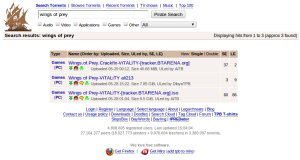Since my last post on the matter (link), I have actually purchased an eBook reader. It’s a Sony thing, which works quite well. That said, I still insist that I’ll never buy an eBook – at least one that’s DRMed. This reader is for work PDF documents, books in the public domain, and other items I can obtain legally.
A story just came out (link) that reminds me why I have no appetite for paid-for DRMed eBook: Amazon just decided to take down a portion of it’s erotica books from it’s site. Not only is it doing that, however, but it’s also going to remove those books off of the personal libraries of the customers that bought the titles. You read that right: they’re going to delete books from the customers that purchased them.

The erotica books in question deal with incest. Alright, so incest is not my thing. But these books deal with adults, and as far as I’m concerned, you should be able to read whatever floats your boat. We’re talking about words and language here.
If Amazon wants to take the books off of their site, that’s fine. They’re allowed to choose what they want to sell or not. What crosses the line is when they go into their customer’s private space, into their digital library, and delete the content they don’t want their customers to have. This is why I maintain that when you buy something that’s DRMed, you don’t own it. You think you’re purchasing it, but in fact, these companies are “renting” whatever you bought – at full price.
Another DRM frustration: I bought a good game the other day called Wings of Prey (link). It’s a good game, but the DRM they put on it limits me the amount of times I can install it to 3 times. Keep in mind, games I love, like Battlefield 2, have been easily installed a dozen times over the last five years. My computers change, the hard drives die, shit happens. So now if I install Wings of Prey twice more, I’ll be forbidden from using the product I legally purchased.

The most annoying bit is that this is all in the name of stopping piracy, and yet, it doesn’t. The pirates still get to play the game, and they don’t even get their books deleted off of their eReaders, or have limits on how many times they can enjoy the game that you or I purchased at full price.

Piracy is supposed to entice people because it’s free, not because it’s better.

Comments
3 responses to “A reminder why I wouldn’t buy an eBook”
I knew there would be a follow up!
Now that you have amended all the conditions on which you would not purchase an electronic book, I concur for the most part.
I like the idea of etextbooks though, that could be updated and that are not massive things to carry around with you. I think licensing for that is a brilliant practice that schools should get into.
The deleting things a person has purchased is called damage to property in any other practice, and in lieu of deletion there should be an option to remove from your library and save it to a third party area, or receive credit of equal or greater value for what you spent to get said “taboo” ebook.
… can we start an ebook store?
I think an e-textbook is a great idea. Being able to search through textbooks in a matter of seconds would be very useful, as would being able to zip forward to the solution of a problem you just tried.
I have no qualms with the idea of renting out an eBook for a period of time. For instance, paying 50% of the purchase price of a textbook to have a digital version for the duration of a semester. What I do have a problem with is that these companies say you’re purchasing to “own” a book, when in fact, when you check the license, it’s “renting for an indefinite period of time.”
The thing with Amazon is that it’s license, that you agree to when downloading the book, stipulates that they can do exactly what was done in this case. So it isn’t damaging your property, since you agreed to it. It’s a shoddy practice, and they get away with it because it isn’t a traditional print book.
Imagine if every book you bought was wrapped in plastic, and there was a 30 page license on it’s cover which afforded the publisher all these extra liberties on top of what the law already provides in terms of copyrights. Opening the shrinkwrap is agreeing to the license, which includes the right of publishers to come into your home and taking the book out of your shelf, if they later go bankrupt, or stop carrying it. People would not buy the book. But because this is a different medium, companies get away with it.
It would seem to me to be illegal to retroactively ”disown” someone’s book, (digital or otherwise). A transaction was made in which Amazon has already profitted. There was an agreement at point of purchase,to have a product in exchange for money. ..but in this case..only the ”use” of the product, was purchases, for as long as the company deems…However, it would seem fair and reasonable if Amazon were to re-emburse the buyers for their repossessed purchases. Car makers, when recalling a model for whatever reason, have to repay their clients. Many people will lose faith in dealings with Amazon..Their greed will be their downfall.
Hopefully this distateful practice will be remedied by protective legislation.